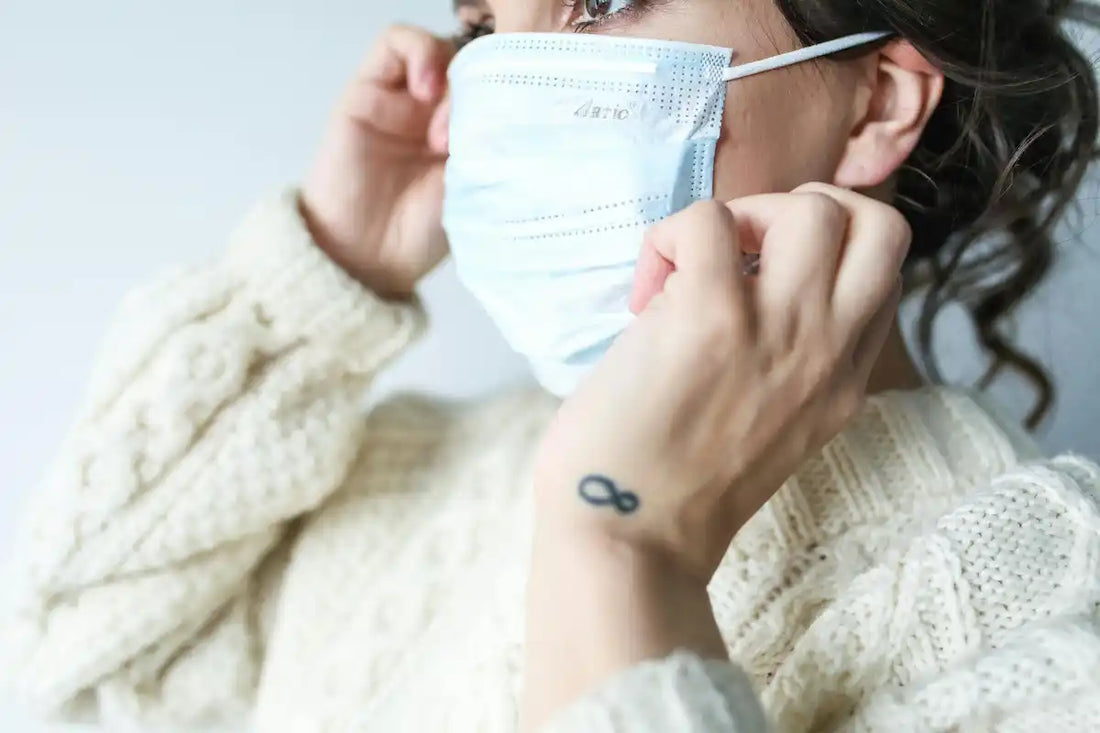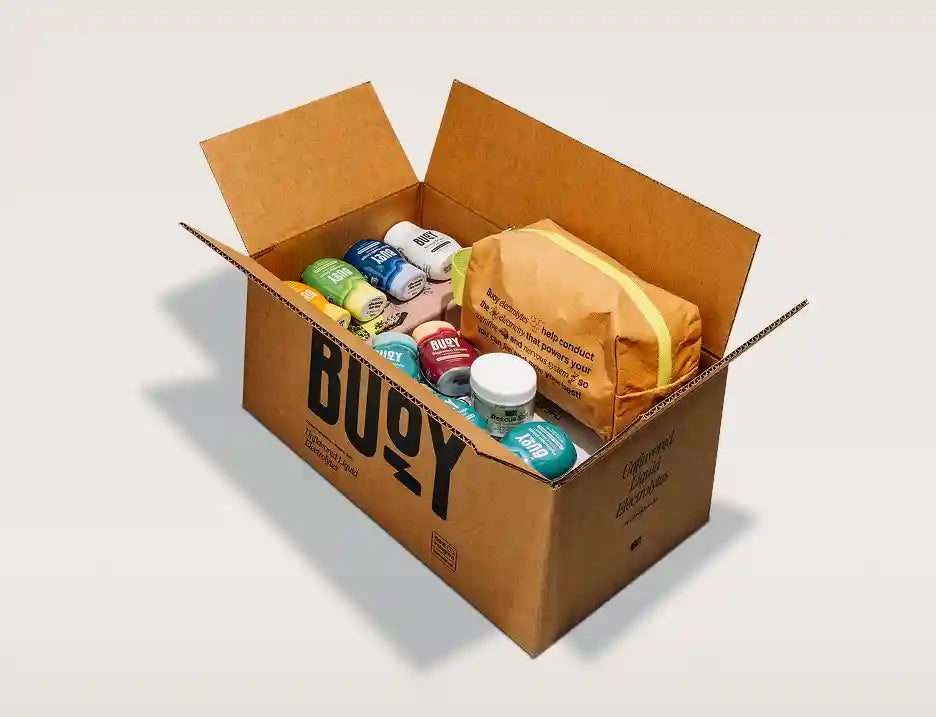
Electrolytes After Illness: Recovery & Long COVID Support
Share
Electrolytes for post-illness recovery are the minerals your body needs to regulate fluid balance, support muscle and nerve function, aid nutrient absorption, and assist normal immune processes.[1][2][3] Using a clean, sugar-free formula such as Buoy Immunity Drops can help replenish what’s lost during illness, support hydration, and restore energy with less risk of digestive upset or crashes.
Recovering from COVID-19 or any serious illness often brings lingering fatigue, dehydration, disrupted appetite, and a sense that your body hasn’t quite bounced back. Even when the infection clears, after-effects like weakness, brain fog, or muscle aches can persist. One of the key pillars of healing during this recovery phase is restoring your body’s electrolyte and hydration balance.[4][5]
Essential Takeaways
- Illness, fever, vomiting, and diarrhea deplete both fluids and key electrolytes such as sodium, potassium, and magnesium.[4][5][6]
- Electrolytes are essential for muscle recovery, nerve conduction, heart rhythm, and cellular repair.[1][2][3]
- Trace minerals such as zinc and selenium help immune function and antioxidant defense.[7][8]
- Balanced hydration you need more than just water to restore energy efficiently.[4][5]
- Buoy Immunity Drops provide clean hydration support without sugar or caffeine.
- Always consult your healthcare provider if you have kidney, heart, or chronic conditions that affect electrolyte balance.[6]
How Illness Disrupts Electrolyte & Hydration Balance
When your body fights infection, fever raises metabolic rate and sweating increases fluid and sodium loss. Vomiting or diarrhea accelerate electrolyte depletion.[4][5][6] Nausea and reduced appetite can further limit intake of fluids and minerals just when your body needs more. Even after symptoms subside, it takes time for the kidneys, which regulate electrolyte levels, to rebalance. Certain medications for fever or congestion can also alter this equilibrium.[5]
This “invisible depletion” explains why you can drink plenty of water yet still feel weak, foggy, or dizzy. Your cells may have water but lack the minerals that move it efficiently. Restoring electrolytes helps stabilize blood pressure, muscle contraction, and nerve signaling so recovery feels faster and steadier.[1][2][3]
Why Long COVID and Post-Viral Recovery Can Feel So Draining
After viral infections such as COVID-19, low-grade inflammation and autonomic nervous-system changes can persist, leading to ongoing fatigue, brain fog, and dizziness. Public-health and clinical reviews note that some people develop dysautonomia (e.g., orthostatic intolerance/POTS), affecting heart-rate and blood-pressure regulation.[9][10][11] Electrolytes, especially sodium and potassium, influence these mechanisms, and maintaining balance may help support steadier circulation and energy.
Key Electrolytes & Nutrients Needed for Recovery
Sodium & Potassium
Together these minerals regulate fluid exchange between cells and blood, nerve impulses, and muscle contraction. Low sodium can cause dizziness or low blood pressure; potassium counterbalances sodium and supports heart rhythm and cellular hydration.[2][4][5] During fever, vomiting, or sweating, both decline, restoring them through mineral-rich foods or clean electrolyte supplements improves recovery.
Magnesium
Magnesium drives more than 300 enzyme reactions for muscle relaxation, nerve transmission, and energy production.[1] Low levels may lead to cramps, poor sleep, or anxiety. Replenishment through nuts, seeds, greens, legumes, or gentle supplements supports more restful recovery.
Calcium
Beyond bone health, calcium helps muscles and blood vessels contract and relax properly.[3] Dairy, tofu set with calcium, fortified plant milks, and leafy greens provide reliable sources during recovery.
Trace Minerals: Zinc & Selenium
Zinc contributes to immune-cell function and tissue repair, while selenium supports antioxidant defense against infection-related stress.[7][8] Low intake is common when appetite is reduced; restoring these trace minerals helps immune normalization.
B-Vitamins & Vitamin C
B-vitamins support energy metabolism, and vitamin C aids collagen synthesis and immune-cell repair. During illness, needs rise while intake often falls. Adding citrus, berries, leafy greens, or fortified yogurt helps replenish them naturally.[9]
How Immunity Drops Support Post-Illness Hydration
Buoy Immunity Drops provide bioavailable electrolytes and trace minerals in a sugar-free liquid format, which may be easier to tolerate when appetite or digestion are reduced. Each serving complements, not replaces, food-based intake to support hydration and mineral balance.[1][2][3]
Building a Post-Illness Hydration Plan
- During illness: Sip fluids frequently rather than in large amounts. Add electrolytes or ORS to replace sodium and potassium; include clear broths for gentle mineral intake.[5][6]
- Early recovery: Gradually increase fluids and incorporate coconut water or vegetable broth. Eat small, balanced meals with protein, complex carbs, and mineral-dense foods like spinach or yogurt.[4]
- Full recovery: Return to whole foods, leafy greens, legumes, fruits, nuts, fish, and dairy, and moderate caffeine or alcohol, which increase fluid loss.[3][4]
Electrolyte-Rich Foods for Recovery
- Broth-based soups with vegetables and rice noodles add sodium and potassium.
- Yogurt bowls with banana, oats, and nuts provide calcium, potassium, and magnesium.
- Smoothies with coconut water, spinach, and fruit supply minerals and antioxidants.
- Baked potatoes or sweet potatoes with olive oil and sea salt restore potassium.
- Legume dishes like lentil soup or bean salads offer sustained mineral support.
Lifestyle Factors Affecting Recovery Hydration
- Rest adequately: Sleep supports electrolyte regulation and immune repair.
- Manage heat: High temperature increases sweat and mineral loss.
- Move gently: Light activity improves circulation and nutrient distribution.
- Limit stimulants: Excess caffeine or alcohol depletes electrolytes.
- Review medications: Some (diuretics, steroids) affect sodium and potassium balance, monitor with your clinician.[6]
When to Seek Medical Guidance
Most mild dehydration can be managed at home, but seek professional help if confusion, irregular heartbeat, swelling, dark urine, or persistent fatigue occur.[5][9] For long COVID or chronic post-viral symptoms, combine electrolyte support with medical follow-up and supervised rehabilitation.
References
- NIH Office of Dietary Supplements — Magnesium: Health Professional Fact Sheet.
- NIH Office of Dietary Supplements — Potassium: Health Professional Fact Sheet.
- NIH Office of Dietary Supplements — Calcium: Health Professional Fact Sheet.
- Mayo Clinic — Dehydration: Symptoms and Causes.
- CDC Yellow Book — Travelers’ Diarrhea (rehydration guidance).
- World Health Organization — Oral Rehydration Salts: Production and Use.
- NIH Office of Dietary Supplements — Zinc: Health Professional Fact Sheet.
- NIH Office of Dietary Supplements — Selenium: Health Professional Fact Sheet.
- CDC — Long COVID Basics.
- NIH RECOVER Initiative — Official Site.
- American Family Physician — Long COVID: Rapid Evidence Review.




